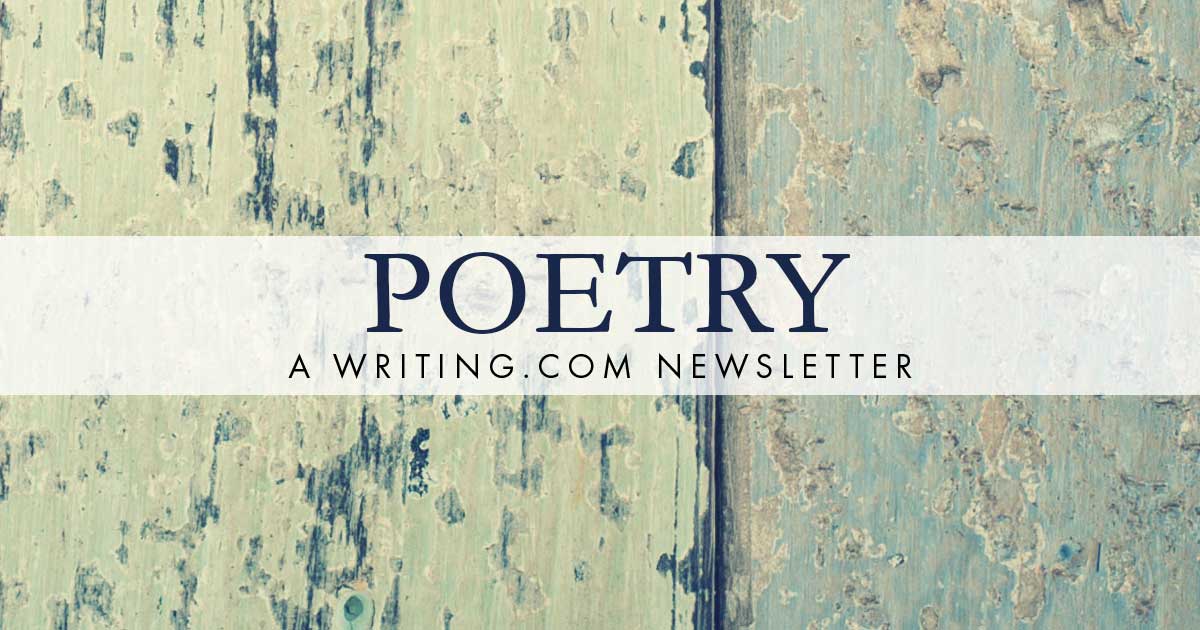This week: Bottom side up-Inside out-Upside down? Edited by: Fyn  
More Newsletters By This Editor 
![Table of Contents [#401437]
Table of Contents](https://www.Writing.Com/main/trans.gif) ![Table of Contents [#401437]
Table of Contents Table of Contents](/main/images/action/display/ver/1709303267/item_id/401437.png)
1. About this Newsletter
2. A Word from our Sponsor
3. Letter from the Editor
4. Editor's Picks
5. A Word from Writing.Com
6. Ask & Answer
7. Removal instructions
![About This Newsletter [#401439]
About This Newsletter](https://www.Writing.Com/main/trans.gif) ![About This Newsletter [#401439]
About This Newsletter About This Newsletter](https://www.writing.com/main/images/action/display/ver/1709303676/item_id/401439.png)
A poet is, before anything else, a person who is passionately in love with language. ~~W. H. Auden
A poem begins as a lump in the throat, a sense of wrong, a homesickness, a lovesickness. ~~Robert Frost
Poetry is what in a poem makes you laugh, cry, prickle, be silent, makes your toe nails twinkle, makes you want to do this or that or nothing, makes you know that you are alone in the unknown world, that your bliss and suffering is forever shared and forever all your own. ~~Dylan Thomas
Poetry is the journal of the sea animal living on land, wanting to fly in the air. Poetry is a search for syllables to shoot at the barriers of the unknown and the unknowable. Poetry is a phantom script telling how rainbows are made and why they go away.~~Carl Sandburg
Painting is silent poetry, and poetry is painting that speaks. ~~Plutarch
|
![Letter from the editor [#401442]
Letter from the editor](https://www.Writing.Com/main/trans.gif) ![Letter from the editor [#401442]
Letter from the editor Letter from the editor](https://www.writing.com/main/images/action/display/ver/1709303784/item_id/401442.png)
A phrase, a snippet of words, the hindsight of a thought, a mouthful of emotion caught just before swallowing -- scribbled down before lost in the shuffle of onrushing thoughts or conversation: these often become the springboard for a poem.
Many a poet starts with the words, the image the phrase and then continues to build from there.
I would offer the suggestion which may lead to a far more powerful poem: to have that rare thought or word combination be the end of the poem, the final thought, the conclusion rather than the beginning. Doing this forces the writer to examine why this phrase caught the fancy to begin with. Why did it strike? What's behind it? Rather than use it as a point to leap off the cliff, use it as the resolution, having built the poem to showcase that moment of Epiphany.
The examination may become a part of the poem, or not, but it is in those moments under the mental microscope where one can see all the layers. This is important because it helps find the true focus. This allows the poet to zero in on what actually is being or needs to be said. This is where the language can be crafted because it is in that clarity that metaphors are born. It is the place where layers form, where bridges between the symbolic and the real are constructed.
Think of that phrase as the climax to the poem rather than as an opening salvo.
Try turning your approach to poetry inside out or upside down. If, indeed, you feel you must begin with those words. Write them down as the last line, and write the poem from the bottom up! Again, this will force you to look at all the reasons why those words caught your emotion, your mind and stopped it in their tracks long enough for you to think that they needed to be part of a poem. The why is important. The sound of them? The juxtaposition of sounds? The play on words? Whatever the inspiration, give those words the power, the impact they deserve. This will make the poem have more depth, more impact and more meaning to the reader.
|
![Editor's Picks [#401445]
Editor's Picks](https://www.Writing.Com/main/trans.gif) ![Editor's Picks [#401445]
Editor's Picks Editor's Picks](https://www.writing.com/main/images/action/display/ver/1709303830/item_id/401445.png)
![Word From Writing.Com [#401447]
Word from Writing.Com](https://www.Writing.Com/main/trans.gif) ![Word From Writing.Com [#401447]
Word from Writing.Com Word from Writing.Com](https://www.writing.com/main/images/action/display/ver/1709303874/item_id/401447.png)
Have an opinion on what you've read here today? Then send the Editor feedback! Find an item that you think would be perfect for showcasing here? Submit it for consideration in the newsletter!
https://www.Writing.Com/go/nl_form
![Ask & Answer [#401448]
Ask & Answer](https://www.Writing.Com/main/trans.gif) ![Ask & Answer [#401448]
Ask & Answer Ask & Answer](https://www.writing.com/main/images/action/display/ver/1709303902/item_id/401448.png)
![Unsubscribe [#401452]
Removal Instructions](https://www.Writing.Com/main/trans.gif) ![Unsubscribe [#401452]
Removal Instructions Removal Instructions](https://www.writing.com/main/images/action/display/ver/1709303960/item_id/401452.png)
To stop receiving this newsletter, click here for your newsletter subscription list. Simply uncheck the box next to any newsletter(s) you wish to cancel and then click to "Submit Changes". You can edit your subscriptions at any time.
|
